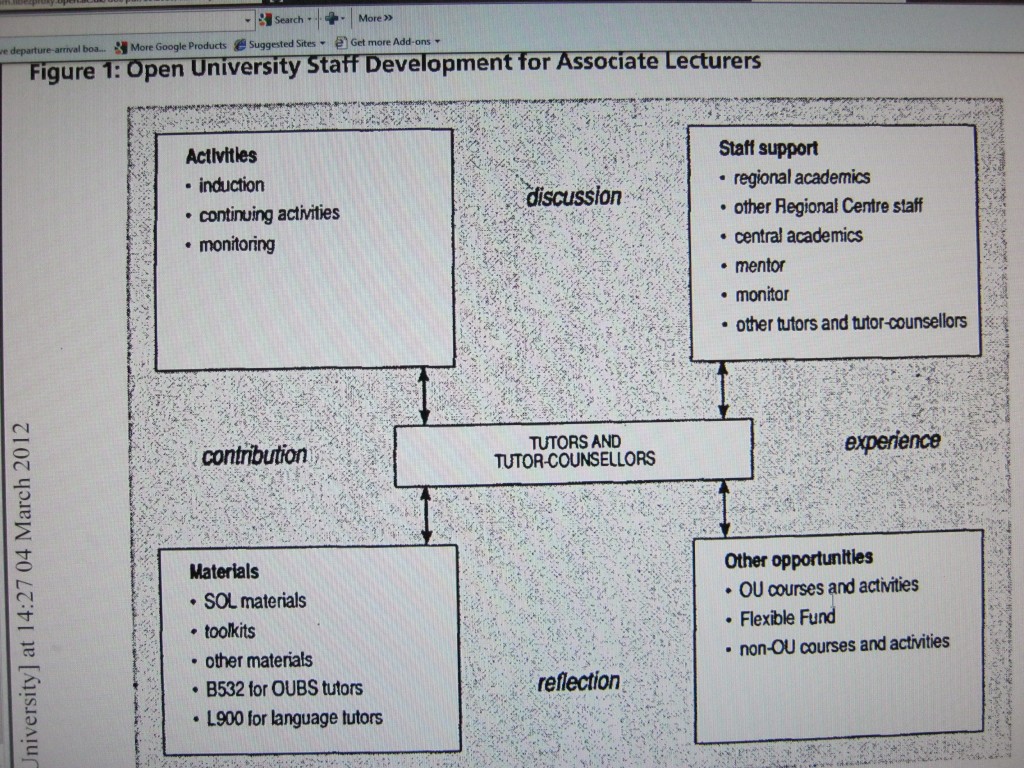Answers to the OUSA History of the OU quiz
Wednesday, June 27th, 2012
 1. Who is the Open University’s current Chancellor? (more…)
1. Who is the Open University’s current Chancellor? (more…)
 1. Who is the Open University’s current Chancellor? (more…)
1. Who is the Open University’s current Chancellor? (more…)
The Open University Students Association (OUSA) is holding its conference 22-24 June on the Walton Hall campus.
There will opportunities to learn about studying, careers, faculties, research and to meet the Vice Chancellor. There is also the History of the OU Quiz. You’ll be able to pick up copies when you come along to the talk about the history of the OU at 4pm in the Jennie Lee Building Room 1. Alternatively, you can pick up copies on the Campus History Tour. Meet at the OUSA Desk at 3pm. Both these events will take place on 22nd June. The quiz answers will appear on this blog on 27th June at two minutes past midnight.
The OU has long been in a league of its own. Many have seen it as rising above the others in a manner comparable to the way the inspirational tower associated with Blackpool is clearly far above the flat countryside of the Ipswich Town tractor boys. (more…)
Distaining to take the hint offered by Professor Malcolm Chase who suggested that ‘there are rather more histories of adult education than of other fields which would seem as deserving of historical scutiny, for example … higher education’, Vaughan College, Leicester has seized the opportunity of an anniversary, its 150th birthday, to reflect on its past (Chase ‘”Mythmaking and mortmain”: the uses of adult education history’, Studies in the Education of Adults, 27, 1 ,1995, p.52). The event will be marked by three main sessions over July 2nd – July 3rd 2012 which will look at what Vaughan College has stood for, how ‘the Vaughan tradition’ now fits into current thinking, policy and practice and the place of adult education in contemporary society.
It opens at 4.30 on the 2nd with a talk by AA100 author and AL at the OU, Dr Lucy Faire who is also Director of the HE Certificate in Modern British History at Vaughan College. (more…)
You can never go to an OU summer school without seeing this amazing cross-section of society. The first time it brought tears to my eyes, the beauty of it … I was in an all-male college at Oxford which was mainly Etonians who were charming people, but I can’t kid myself for a moment that Trinity had anything on the majesty or poetic brilliance and imagination of the Open University.The Open University is a century or two ahead of Oxford.
On the website Catherine Smith has uploaded an account of an OU examination when ‘we sat in a room four floors up which looked out onto a small courtyard; every few minutes the lid of the rubbish container creaked as if it was in the same room. After that I started to wear a pair of industrial ear protectors during exams’.
Janet Wardle was an ‘A’ year (1971) student who, due to her husband’s job, moved to Rome in 1972 but then could not sit the examination as the papers were lost in the post. On her return to London she sat the examination ‘stuffed between high-shelved bookcases with someone typing behind them’.
If you have an OU examination story that you’d like to share you can do this via the website.
 The need for guidance for associate lecturers (tutors) was identified in 1969 and in 1971 a briefing and training policy was introduced. This focused on briefing of new staff but in 1972 Course Tuition was introduced and in 1973 Teaching by correspondence for the OU. In 1987 a Staff Development policy emphasised the need for continued professional learning. A set of Open Teaching materials was produced to support the policy, including Open Teaching a handbook on teaching and counselling. There was also a manual, The Open Teaching File and a set of ‘toolkits’ about a variety of topics including study skills and support for disabled students. In 1993 Maggie Coats produced an evaluation of the Open Teaching materials and the student-centred Supporting Open Learning materials followed. These were widely used and developed. A fund for personal development was opened in 1987. In 1992 this was revised to encourage continuing professional development and it was revised again in 1997 to incorporate provision for peer mentoring. By comparison induction for full-time academic staff was introduced in 1995 and a programme of staff development for them introduced in 1998.In 1999 there were approximately 7.400 part-time associate lecturers of whom 10% had no other employment and 70% worked in educational institutions and 45 of them within HEIs. In 1997 the Dearing Report recommended accreditation for HE academics and the Institute of Learning and Teaching was established. At the OU a Centre for Higher Education Practice was opened. It ran courses and produced materials.
The need for guidance for associate lecturers (tutors) was identified in 1969 and in 1971 a briefing and training policy was introduced. This focused on briefing of new staff but in 1972 Course Tuition was introduced and in 1973 Teaching by correspondence for the OU. In 1987 a Staff Development policy emphasised the need for continued professional learning. A set of Open Teaching materials was produced to support the policy, including Open Teaching a handbook on teaching and counselling. There was also a manual, The Open Teaching File and a set of ‘toolkits’ about a variety of topics including study skills and support for disabled students. In 1993 Maggie Coats produced an evaluation of the Open Teaching materials and the student-centred Supporting Open Learning materials followed. These were widely used and developed. A fund for personal development was opened in 1987. In 1992 this was revised to encourage continuing professional development and it was revised again in 1997 to incorporate provision for peer mentoring. By comparison induction for full-time academic staff was introduced in 1995 and a programme of staff development for them introduced in 1998.In 1999 there were approximately 7.400 part-time associate lecturers of whom 10% had no other employment and 70% worked in educational institutions and 45 of them within HEIs. In 1997 the Dearing Report recommended accreditation for HE academics and the Institute of Learning and Teaching was established. At the OU a Centre for Higher Education Practice was opened. It ran courses and produced materials.
For more on this subject see Anne Langley and Isabel Perkins, ‘Open University staff development materials for tutors of open learning’, Open Learning, 14, 2, June 1999, pp. 44-51. We would also value hearing from ALs and students about supporting open learning.
Duncan Campbell has recently contributed an article about an OU student to The Observer, 22 January 2012. Graham Godden was sent, aged 12, to a home for “maladjusted boys” for attacking a teacher. Later he became an addict and an armed robber,was featured on Crimewatch as the ‘M25 Bandit’ and called by the Sunday Mirror ‘Britain’s most wanted robber’. He was imprisoned and is now on an Open University degree course in criminology and social sciences. He admits to have being influenced by a film about another OU student. I used to look at the film McVicar [about the robber John McVicar] and think: ‘My God, I wish I was like him.’
Have you got an OU story? You can upload your OU story on the website.
Writing in the THES on 6th October 2011, Martin Bean argued that the ‘vital work’ of the OU was to support widening participation and social mobility. He went on to refer to the history of the OU, using a familial image:
I recently heard The Open University described as the “grandaddy” of widening participation into education. The title was gratifying, but being the grandaddy brings with it a responsibility to work with the rest of the higher education sector and the government to ensure that we do what is necessary to provide the best possible opportunities – and outcomes – for future generations…. we must redouble our efforts to ensure that all of those who wish to study are able to do so.
![]() The view that degrees should be seen in individual, economic terms was emphasised today by the production of data about graduates’ salaries six months after graduating. International consultants The Parthenon Group drew on data from the Higher Education Statistics Agency and concluded that some post-1992 institutions do just as well as or better than many Russell Group institutions on employment outcomes. Sally Hunt, general secretary of the University and College Union, said the analysis risked contributing to a “fast food” vision of higher education. She added that
The view that degrees should be seen in individual, economic terms was emphasised today by the production of data about graduates’ salaries six months after graduating. International consultants The Parthenon Group drew on data from the Higher Education Statistics Agency and concluded that some post-1992 institutions do just as well as or better than many Russell Group institutions on employment outcomes. Sally Hunt, general secretary of the University and College Union, said the analysis risked contributing to a “fast food” vision of higher education. She added that
Universities are not just graduate factories turning out a ready supply (of employees) for business – they are there to teach a diversity of academic subjects for a wide range of purposes that serve all our communities
This has echoes of Harold Wilson’s response when asked about housewife students at the OU:
I’m not at all appalled at this. They are having a chance they have never had before. I’ve never thought of the Open University as a technical college for vocational education. It doesn’t matter if their degrees never earn them a penny piece (Education & Training, December 1972)
However, since 1972 the pressures to conceptualise the university in terms of the market have grown.